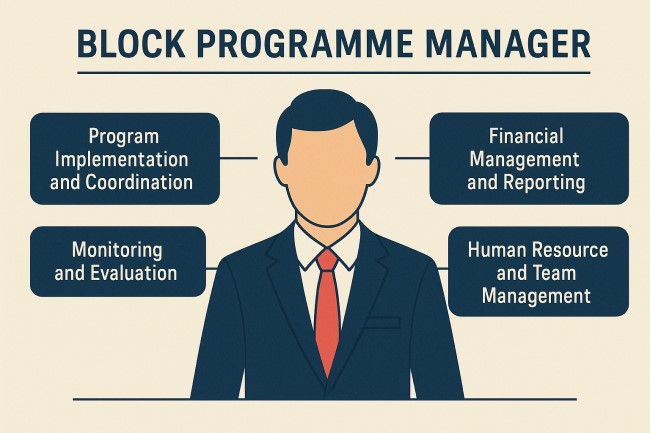Block Programme Manager: Building Local Leadership and Talent Management in Development Programs

A Block Programme Manager plays a pivotal role in executing government and development schemes at the grassroots level. Positioned at the block—a sub-district administrative unit—this individual ensures that projects run smoothly, efficiently, and meet the intended goals. As development work increasingly focuses on impact, sustainability, and capacity building, the role of the Block Programme Manager (BPM) becomes even more critical. Moreover, integrating structured approaches like Berger & Berger’s building blocks for creating talent management programmes further strengthens the effectiveness of the position.
Understanding the Role of a Block Programme Manager
The Foundation of Local Governance
The block level is often the most active unit of governance in rural or semi-urban development. The Block Programme Manager is the central coordinator at this level. Whether it is health care delivery, agricultural support, or women empowerment programs, BPMs are the engine that drives implementation and ensures accountability.
Key Responsibilities of a Block Programme Manager
1. Program Implementation and Coordination
At the heart of the BPM’s role is managing and coordinating development programs initiated by the central or state government. This includes:
-
Creating detailed implementation plans.
-
Allocating resources and assigning tasks.
-
Coordinating with other departments and local institutions.
2. Monitoring and Evaluation
Performance tracking is a significant part of the BPM’s duties. Through data collection and field visits, they monitor progress and suggest improvements. Regular reporting helps ensure transparency and timely interventions.
3. Financial Management and Reporting
Budget utilization is a sensitive issue in public programs. BPMs are responsible for:
-
Preparing budget plans at the block level.
-
Ensuring proper fund disbursal and usage.
-
Submitting utilization certificates and financial reports.
4. Human Resource and Team Management
Often supervising teams that include field workers, community mobilizers, and volunteers, BPMs must show strong leadership. They must train, motivate, and monitor performance across diverse teams.
Qualifications and Skills Required
Academic Background
Most BPM roles require:
-
A graduate or postgraduate degree in Social Work, Rural Development, Public Health, or Business Administration.
Key Skills
-
Leadership and strategic thinking
-
Communication and interpersonal skills
-
Data handling and reporting
-
Budget and fund management
Impact of Block Programme Managers in Development Programs
Driving Sustainable Growth at the Grassroots
BPMs are often the bridge between policy and people. Their work ensures that the benefits of schemes like health missions, livelihood programs, and education drives reach the intended populations.
Enabling Community Participation
A well-functioning BPM engages local communities, promotes awareness, and drives participatory development. From organizing Gram Sabhas to collaborating with Self-Help Groups (SHGs), the BPM promotes inclusive development.
Integrating Talent Development: The Berger & Berger Model
What Is the Berger & Berger Talent Management Framework?
Berger & Berger’s building blocks for creating a talent management programme is a strategic framework used to identify, develop, and retain talent in organizations. This model includes:
-
Strategic Workforce Planning
-
Talent Acquisition and Onboarding
-
Performance Management
-
Learning and Development
-
Succession Planning
-
Retention Strategies
Relevance to the Block Programme Manager Role
BPMs can utilize Berger & Berger’s principles to build strong, efficient, and motivated local teams. Here’s how:
Strategic Workforce Planning at the Block Level
Assessing skill gaps, forecasting future needs, and planning workforce accordingly ensures program sustainability. BPMs can create local manpower inventories to plan resource allocation effectively.
Performance and Learning Culture
By setting clear performance goals and investing in training, BPMs create a development-focused work culture. Local volunteers and staff become more capable and confident in their roles.
Succession and Retention
High turnover in rural programs is a common challenge. BPMs can use retention strategies and succession planning to maintain continuity and build long-term capacity within communities.
Challenges Faced by Block Programme Managers
1. Resource Limitations
Lack of proper infrastructure, insufficient budgets, or shortage of trained personnel often hampers progress.
2. Administrative Hurdles
Delays in fund releases, bureaucratic procedures, and overlapping roles with other officials can affect efficiency.
3. Community Resistance
In some areas, lack of awareness or resistance to change from the community can be a barrier. Building trust is essential.
Best Practices for Success as a Block Programme Manager
1. Adopt a People-Centered Approach
Engage with local communities regularly. Understanding their needs and earning their trust can improve participation and outcomes.
2. Strengthen Local Institutions
Work closely with Panchayats, schools, health centers, and SHGs to build local leadership and create shared ownership.
3. Use Data for Decision-Making
Make use of monitoring systems and field data to make informed decisions and course corrections.
4. Invest in Capacity Building
Continuous training, mentoring, and development of field teams are crucial for program success.
Conclusion
The Block Programme Manager is more than just a project executor. They are change-makers, community leaders, and talent builders. By adopting frameworks like Berger & Berger’s building blocks for talent management, they can enhance team efficiency, drive better program outcomes, and leave behind stronger institutions. As governments and NGOs focus more on accountability, impact, and sustainability, the Block Programme Manager’s role is only going to grow in importance.



